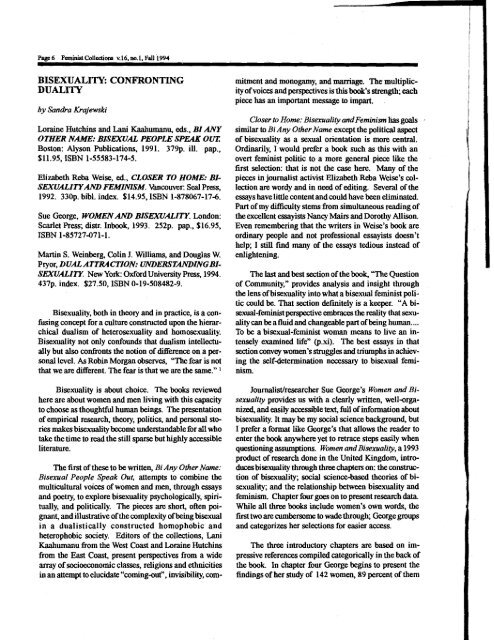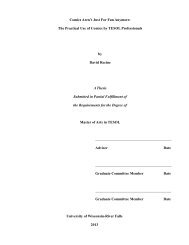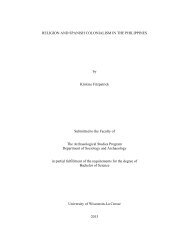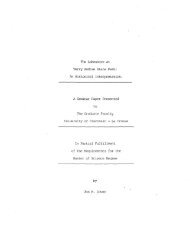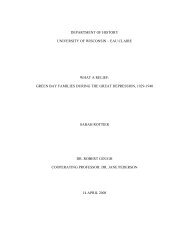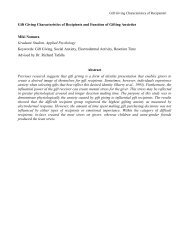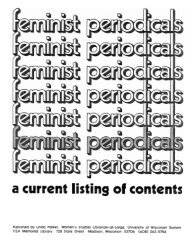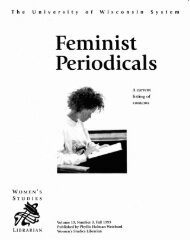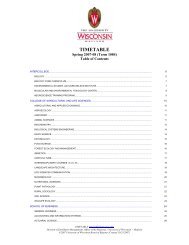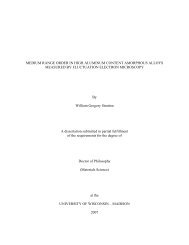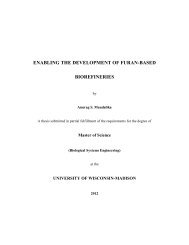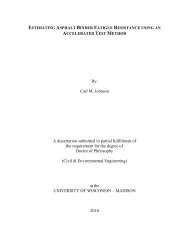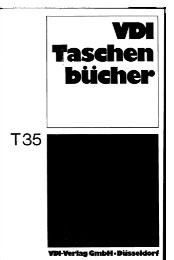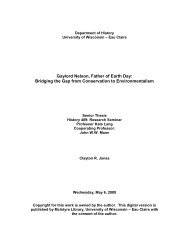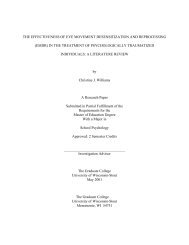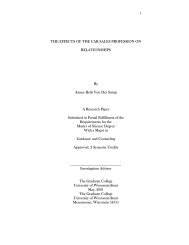1 CONFRONTS THE TEXTBOOK.. - MINDS@UW Home - University ...
1 CONFRONTS THE TEXTBOOK.. - MINDS@UW Home - University ...
1 CONFRONTS THE TEXTBOOK.. - MINDS@UW Home - University ...
You also want an ePaper? Increase the reach of your titles
YUMPU automatically turns print PDFs into web optimized ePapers that Google loves.
Pape 6 Feminist Colledions v.16. m. 1. Fa11 1994<br />
BISEXUALITY.. CONFRONTING<br />
DUALITY<br />
by Sandra Krajewski<br />
Loraine Hutchins and Lani Kaahumanu, eds., BI ANY<br />
O<strong>THE</strong>R NAME: BISEXUAL PEOPLE SPEAK OUT.<br />
Boston: Alyson Publications, 1991. 379p. ill. pap.,<br />
$11.95. ISBN 1-55583-174-5.<br />
Elizabeth Reba Weise, ed., CLOSER TO HOME: BI-<br />
SEXUALITYAND FEMIMSM. hncower: Seal Press,<br />
1992. 330p. bibl. index. $14.95, ISBN 1-878067-17-6.<br />
Sue George, WOMEN AND BISEXUALITY. London:<br />
Scarlet Press; distr. Inbook, 1993. 252p. pap., $16.95,<br />
ISBN 1-85727-071-1.<br />
Martin S. Weinberg, Colin J. W~lliarns, and Douglas W.<br />
Pryor, DUAL ATTRA CTION: UNDERSTANDNGBI-<br />
SEXUALITY. New Yo*: Oxford Univenity hess, 1994.<br />
437p. index. $27.50, ISBN 0-19-508482-9.<br />
Bisexuality, both in theory and in practice, is a con-<br />
fusing concept for a culture constructed upon the hierar-<br />
chical dualism of heterosexuality and homosexuality.<br />
Bisexuality not only confounds that dualism intellectu-<br />
ally but also confronts the notion of difference on a per-<br />
sonal level. As Robin Morgan observes, "The fear is not<br />
that we are different. The fear is that we are the same." '<br />
Bisexuality is about choice. The books reviewed<br />
here are about women and men living with this capacity<br />
to choose as thoughtful human beings. The presentation<br />
of empirical research, theory, politics, and personal sto-<br />
ries makes bisexuality become understandable for all who<br />
take the time to read the still sparse but highly accessible<br />
literature.<br />
The first of these to be written, Bi Any Other Name:<br />
Bisexual People Speak Out, attempts to combine the<br />
multicultural voices of women and men, through essays<br />
and poetry, to explore bisexuality psychologically, spiritually,<br />
and politically. The pieces are short, often poign&c<br />
and ~lustrative of the complexity of being bisek<br />
in a dualistically constructed homophobic and<br />
heterophobic society. Editors of the coll&ons, Lani<br />
Kaahumanu from the West Coast and Loraine Hutchins<br />
from the East Coast, present perspectives from a wide<br />
array of socioeconomic classes, religions and ethnicities<br />
in an attempt toelucidate "coming-out", invisibility, com-<br />
mitrnent and monogamy, and marriage. The multiplic-<br />
ity of voices and perspectives is this book's strength; each<br />
piece has an important message to impart.<br />
Closer to <strong>Home</strong>: Bisexuality andFerninism has goals ,<br />
similar to Bi Any Other Name except the political aspect<br />
of bisexuality as a sexual orientation is more central.<br />
Ordinarily, I would prefer a book such as this with an<br />
overt feminist politic to a more general piece like the<br />
first selection: that is not the case here. Many of the<br />
pieces in journalist activist Elizabeth Reba Weise's col-<br />
lection are wordy and in need of editing. Several of the<br />
essays have little content and could have been eliminated<br />
Part of my di&culty stems from simultaneous reading of<br />
the excellent essayists Nancy Mairs and Dorothy Allison.<br />
Even remembering that the writers in Weise's book are<br />
ordinary people and not professional essayists doesn't<br />
help; I still find many of the essays tedious instead of<br />
enlightening.<br />
The last and best section of the book, "The Question<br />
of Community," provides analysis and insight through<br />
the lens of bisexuality into what a bisexual feminist politic<br />
could be. That section definitely is a keeper. "A bisexual-feminist<br />
e v e embraces the reality that sexuality<br />
can be a fluid and changeable part of being human. ...<br />
To be a bisexual-feminist woman means to live an intensely<br />
examined lie" @.xi). The best essays in that<br />
section convey women's struggles and triumphs in achieving<br />
the selfdetennination necessary to bisexual feminism.<br />
Journalistlresearcher Sue George's Women and Bi-<br />
sexuality provides us with a clearly written, well-orga-<br />
nized, and easily accessible text, full of information about<br />
bisexuality. It may be my social science background, but<br />
I prefer a format like George's that allows the reader to<br />
enter the book anywhere yet to retrace steps easily when<br />
questioning assumptions. Women and Bisexuality, a 1993<br />
product of research done in the United Kingdom, intro-<br />
duces bisexuality through three chapters on: the construc-<br />
tion of bisexuality; social science-based theories of bi-<br />
sexuality; and the relationship between bisexuality and<br />
feminism. Chapter four goes on to present research data.<br />
While all three books include women's own words, the<br />
first two are lxunbemme to wade through; George pups<br />
and categorizes her selections for easier access.<br />
The three introductory chapters are based on im-<br />
pressive references compiled categorically in the back of<br />
the book. In chapter four George begins to present the<br />
findings of her study of 142 women, 89 percent of them


